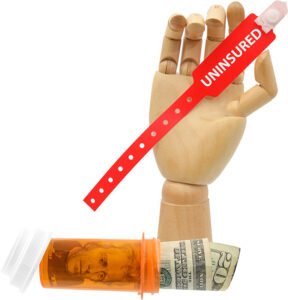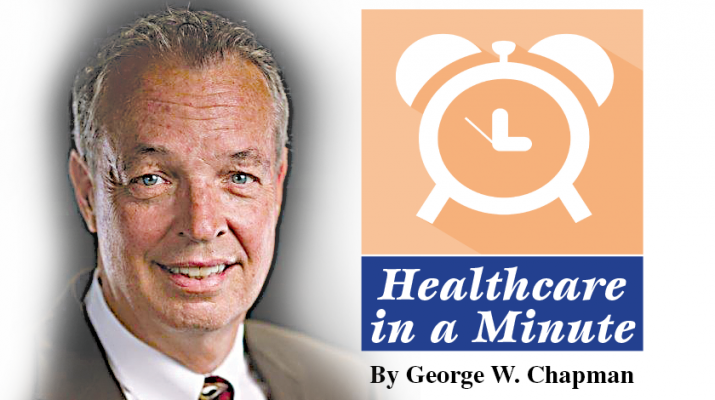By George W. Chapman
 Several national polls revealed 70% of Americans were opposed to the proposed $1 trillion in cuts to Medicaid and 77% of us have a positive attitude toward Medicaid.
Several national polls revealed 70% of Americans were opposed to the proposed $1 trillion in cuts to Medicaid and 77% of us have a positive attitude toward Medicaid.
Nevertheless, the “Big Beautiful Bill” was passed. About 44% of New Yorkers receive some sort of benefit via Medicaid, which includes Child Health Plus, expanded Medicaid on the marketplace, disability and long-term care. The Medicaid cuts will have a devastating impact on our 700 or so rural hospitals. The states with the most rural hospitals are Texas, Kansas, Mississippi, Oklahoma and Georgia. Some 65% to 80% of rural hospital revenue comes from Medicaid. So the impact of millions of people losing their Medicaid coverage will certainly cause hospitals already on the brink of bankruptcy to close. Hospital closures also mean loss of jobs. Rural hospitals are often one of the top employers in a community. When a rural hospital closes, so do smaller businesses in the community that supplied the hospital or depended on its business. Any business considering locating in a rural area will think twice if there isn’t a nearby hospital. The only hope for most rural hospitals is to be absorbed by a regional hospital system. Inpatient beds may close but vital primary, specialty and urgent care would be supported.
Impact of RFK Jr.
The nation’s No. 1 vaccine and science skeptic fired all 17 vaccine experts on the ACIP (Advisory Committee for Immunization Practices) board. Without any evidence, Kennedy claimed they all had “conflicts” and were mere “rubber stamps” for any vaccine. In the past, ACIP board members were rigorously vetted and had to disclose their intentions. Consequently, the board was composed of physicians and scientists with extensive backgrounds in vaccine research and medicine. Kennedy has appointed new members without experience, credentials, vetting or transparency. What could go wrong? Several medical societies have sued Kennedy over the dissolution of the ACIP board. A biotech trade group, after meeting with Kennedy, said in a memo to its members, “He’s a direct threat to public health.” And all this while once-eradicated measles is making a comeback.
Diagnosing with Artificial Intelligence
 By now, who hasn’t used their phone to get a diagnosis? Just enter your symptoms and AI will offer some possible answers, including suggested treatment. There are plenty of programs used by providers to complement and verify their suspicions when it comes to tricky diagnoses. Microsoft AI Diagnostic Orchestrator in a test was four times more accurate than “generalist” providers in correctly diagnosing extremely complicated cases. And it used fewer resources (provider time, lab, imaging, drugs) in reaching the diagnosis. It should be emphasized the study did not include specialists and researchers unsure of the AI efficacy on routine cases. However, with the impending shortage of physicians, AI is a boon to lowering costs and improving provider productivity.
By now, who hasn’t used their phone to get a diagnosis? Just enter your symptoms and AI will offer some possible answers, including suggested treatment. There are plenty of programs used by providers to complement and verify their suspicions when it comes to tricky diagnoses. Microsoft AI Diagnostic Orchestrator in a test was four times more accurate than “generalist” providers in correctly diagnosing extremely complicated cases. And it used fewer resources (provider time, lab, imaging, drugs) in reaching the diagnosis. It should be emphasized the study did not include specialists and researchers unsure of the AI efficacy on routine cases. However, with the impending shortage of physicians, AI is a boon to lowering costs and improving provider productivity.
Prior Authorization Overhaul
Prior authorization has been the bane of physicians and their patients for years. At best it delays care. At worst it denies care. It is an administrative headache for insurers and providers alike. It costs the industry billions. More than 90% of denials are eventually reversed. So, possibly (probably?) because of the onslaught of bad publicity, insurance CEOs met with CMS Administrator Mehmet Oz to discuss ways to improve the burdensome and expensive process. The outcome of the meeting was that the overhaul of prior authorizations will be accomplished voluntarily by the insurers and not via federal legislation. The CEOs in attendance represented more than 75% of the insured lives in the US. The self-determined goals are to be in place no later than Jan. 1, 2027.
Uninsured to Increase
 The “Big Beautiful Bill” will, for the first time in over a century, increase the percentage of Americans without health insurance. The ACA reduced that percentage to around 10% in states that accepted expanded Medicaid and to around 14% in states that did not accept federally supported expanded Medicaid. The congressional budget office estimates that 12 million people will lose their coverage by 2034. Once again, we remain the only economically advanced country to not incorporate a form of universal coverage. Unfortunately, healthcare has been politicized. We have the highest per capita cost of healthcare in the world including underdeveloped countries.
The “Big Beautiful Bill” will, for the first time in over a century, increase the percentage of Americans without health insurance. The ACA reduced that percentage to around 10% in states that accepted expanded Medicaid and to around 14% in states that did not accept federally supported expanded Medicaid. The congressional budget office estimates that 12 million people will lose their coverage by 2034. Once again, we remain the only economically advanced country to not incorporate a form of universal coverage. Unfortunately, healthcare has been politicized. We have the highest per capita cost of healthcare in the world including underdeveloped countries.
Impact of Vaccine Misinformation / Skepticism
 So, can a provider refuse to care for unvaccinated kids? Can an insurance company deny coverage or charge more if you’re unvaccinated? Both good questions First, it is highly unlikely any provider would refuse to care for unvaccinated kids. Besides being unethical, refusal would violate all his insurance participation agreements. Insurance companies can charge more for smokers but cannot if you’re unvaccinated. However, insurers can offer discounts on their normal premium if you and your family are vaccinated. This applies to both commercial carriers and self-insured employers.
So, can a provider refuse to care for unvaccinated kids? Can an insurance company deny coverage or charge more if you’re unvaccinated? Both good questions First, it is highly unlikely any provider would refuse to care for unvaccinated kids. Besides being unethical, refusal would violate all his insurance participation agreements. Insurance companies can charge more for smokers but cannot if you’re unvaccinated. However, insurers can offer discounts on their normal premium if you and your family are vaccinated. This applies to both commercial carriers and self-insured employers.
VA Layoffs Curtailed
 After DOGE recommended cutting an absurd 83,000 jobs from the VA healthcare system (a great way to say “thanks for your service”) the VA will now eliminate “only” 30,000 positions. VA secretary Doug Collins said the cuts, while not nearly as bad, are necessary. The VHA is the country’s largest integrated healthcare system operating 170 medical centers and 1,100 outpatient clinics. It employs about 480,000 people and serves about nine million of 16 million veterans.
After DOGE recommended cutting an absurd 83,000 jobs from the VA healthcare system (a great way to say “thanks for your service”) the VA will now eliminate “only” 30,000 positions. VA secretary Doug Collins said the cuts, while not nearly as bad, are necessary. The VHA is the country’s largest integrated healthcare system operating 170 medical centers and 1,100 outpatient clinics. It employs about 480,000 people and serves about nine million of 16 million veterans.
Made in the US a Dilemma?
 Bringing manufacturing back to the US presents a dilemma. While providing more American jobs, it will probably result in higher costs for durable medical equipment and drugs. Medtech and drug manufacturers are doing their math. Is it cheaper to pay tariffs (which seem to change daily) or move manufacturing to the U.S.? The concern is if drugs are manufactured in the US, undoubtedly costing more, will drug manufacturers increase their lobbying efforts to dismantle or defang Medicare’s ability to finally negotiate prices? Manufacturing in the U.S. is a double-edged sword. It could inadvertently add billions to our costs for healthcare. And if manufacturers move to the U.S., could they be subjected to federally imposed price controls (versus current negotiation of prices). It will take a few years for all to play out.
Bringing manufacturing back to the US presents a dilemma. While providing more American jobs, it will probably result in higher costs for durable medical equipment and drugs. Medtech and drug manufacturers are doing their math. Is it cheaper to pay tariffs (which seem to change daily) or move manufacturing to the U.S.? The concern is if drugs are manufactured in the US, undoubtedly costing more, will drug manufacturers increase their lobbying efforts to dismantle or defang Medicare’s ability to finally negotiate prices? Manufacturing in the U.S. is a double-edged sword. It could inadvertently add billions to our costs for healthcare. And if manufacturers move to the U.S., could they be subjected to federally imposed price controls (versus current negotiation of prices). It will take a few years for all to play out.
 George W. Chapman is a retired healthcare business consultant who worked exclusively with physicians, hospitals and healthcare organizations. He used to operate GW Chapman Consulting based in Syracuse.
George W. Chapman is a retired healthcare business consultant who worked exclusively with physicians, hospitals and healthcare organizations. He used to operate GW Chapman Consulting based in Syracuse.

